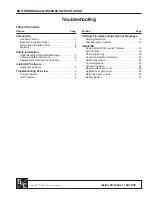
Related Links
31.5.3. Clocks
The SERCOM bus clock (CLK_SERCOMx_APB) is enabled by default, and can be enabled and disabled
in the Main Clock.
The SERCOM uses two generic clocks: GCLK_SERCOMx_CORE and GCLK_SERCOMx_SLOW. The
core clock (GCLK_SERCOMx_CORE) is required to clock the SERCOM while working as a master. The
slow clock (GCLK_SERCOMx_SLOW) is only required for certain functions. See specific mode chapters
for details.
These clocks must be configured and enabled in the Generic Clock Controller (GCLK) before using the
SERCOM.
The generic clocks are asynchronous to the user interface clock (CLK_SERCOMx_APB). Due to this
asynchronicity, writing to certain registers will require synchronization between the clock domains. Refer
to
Related Links
GCLK - Generic Clock Controller
on page 121
on page 141
31.5.4. DMA
The DMA request lines are connected to the DMA Controller (DMAC). The DMAC must be configured
before the SERCOM DMA requests are used.
Related Links
DMAC – Direct Memory Access Controller
on page 432
31.5.5. Interrupts
The interrupt request line is connected to the Interrupt Controller (NVIC). The NVIC must be configured
before the SERCOM interrupts are used.
Related Links
Nested Vector Interrupt Controller
on page 44
31.5.6. Events
Not applicable.
31.5.7. Debug Operation
When the CPU is halted in debug mode, this peripheral will continue normal operation. If the peripheral is
configured to require periodical service by the CPU through interrupts or similar, improper operation or
data loss may result during debugging. This peripheral can be forced to halt operation during debugging -
refer to the Debug Control (DBGCTRL) register for details.
31.5.8. Register Access Protection
All registers with write-access can be write-protected optionally by the Peripheral Access Controller
(PAC), except the following registers:
•
Interrupt Flag Clear and Status register (INTFLAG)
•
Status register (STATUS)
•
Data register (DATA)
Atmel SAM L22G / L22J / L22N [DATASHEET]
Atmel-42402E-SAM L22G / L22J / L22N_Datasheet_Complete-07/2016
594
















































